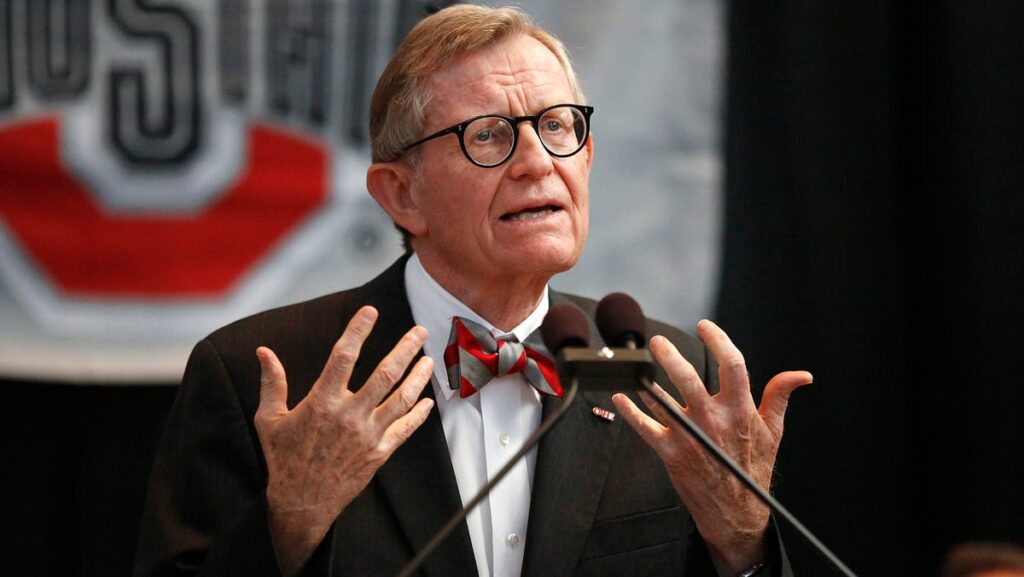Ohio State errored in hiring scandal-prone Gordon Gee
Dispatch Opinion Editor wrote a column saying Gordon Gee carries “too much baggage” and shouldn’t have been hired as an Ohio State consultant.
- E. Gordon Gee, former president and now a consultant for Ohio State University, wrote an op-ed for Fox News calling for diversity of beliefs on college campuses.
- He argued that universities have not done enough to restore order following campus protests related to the war in Gaza.
- Gee proposed that universities must remember their purpose to mold informed citizens, end ideological “addictions” and fight for academic responsibility.
Ohio State University’s former president and current intellectual diversity consultant took a firm stance on some trending higher education topics in an op-ed to Fox News, proclaiming the need for “diversity of beliefs” and calling Students for Justice in Palestine — a national student activism organization with over 250 branches across college campuses — a “pro-Hamas group.”
E. Gordon Gee has returned to campus this fall for a one-year consulting role, in which he’ll work with leaders of a handful of colleges — namely the Salmon P. Chase Center, a new “intellectual diversity center” created through the passage of Ohio Senate Bill 117 that aims to promote civil discourse and prevent alleged leftist ideology from replacing history. In his Fox opinion piece, published Oct. 20, Gee calls for universities to become “arenas for free and unfettered exchange of ideas” and increase their efforts to “welcome populations not traditionally fortunate enough to enjoy an excellent academic education.”
Interwoven in his remarks about intellectual diversity is Gee’s commentary on the war in Gaza. He opens the op-ed with President Donald Trump’s Oct. 13 ceasefire announcement that remaining Isareli hostages had been released, marking the “historic” and “much-needed” end to the war that Gee says began with “Hamas’s massacre of Israeli citizens” and continued with “Israel’s military operation in Gaza.”
“Now that a ceasefire has thankfully been achieved, and Israelis and Palestinians alike can focus on recovering and rebuilding, you would hope life would return to normal on American college campuses, too, after several years of violent demonstrations, illegal encampments and widespread chaos,” Gee writes in the opinion piece. “But that, sadly, may not be the case.”
Gee goes on to reference George Washington University, saying its Students for Justice in Palestine (SJP) branch recently led a protest “not to cheer on the end of hostilities but to advance further grievances against the Jewish state and promise more disruption to life on campus.” He adds that similar events took place at many other universities across the country.
George Washington University’s student newspaper reported in August that its SJP chapter disaffiliated with the university after officials suspended the group for “disorderly conduct” through spring 2027.
Gee writes that universities nationwide have not done enough to “restore order” following these protests to make sure their campuses are “welcoming and nurturing” to all.
“This continuing, intolerable situation, explains why Trump made our universities one of his administration’s top priorities,” Gee writes, referencing Columbia University’s $200 million settlement with the Trump administration after being accused of discriminating against Jewish students and violating Title VI of the Civil Rights Act.
“It does not take a former university president, who just concluded 45 years of service, to realize that these actions reflect a very serious problem in the way universities conduct their affairs.”
Ohio State spokesperson Ben Johnson said in a statement that all university employees can submit letters to the editor and guest columns without university input or review, “as long as they are not speaking on behalf of the university.”
Gee wraps up the piece with three specific measures universities must take to “correct what must be corrected.” He says American universities need to first remember they were created to “train and challenge young Americans to be proud, committed, informed and industrious citizens of this great nation.”
Second, Gee says universities have to stop their “addiction to inflamed ideological convictions,” adding that diversity of all kinds — including intellectual viewpoint diversity — makes for better achievements.
Finally, he writes, universities have to fight for “academic responsibility,” just like they’ve done for “academic freedom.” Gee says instances of “deans berating and mocking students for standing up to bigotry” and “university employees held hostage by playacting ‘revolutionaries'” can’t be tolerated any longer.
“None of these steps, to be sure, are easy. All are essential,” Gee concludes. “As anyone truly dedicated to education will tell you, it is in moments of great crisis that great opportunities usually arise. Ours is at hand. Let us not squander it.
Gee will be the keynote speaker at this year’s 18th annual Association for the Study of the Middle East and Africa in Washington, D.C. this November.
Reporter Emma Wozniak can be reached at ewozniak@dispatch.com or @emma_wozniak_ on X, formerly known as Twitter.

